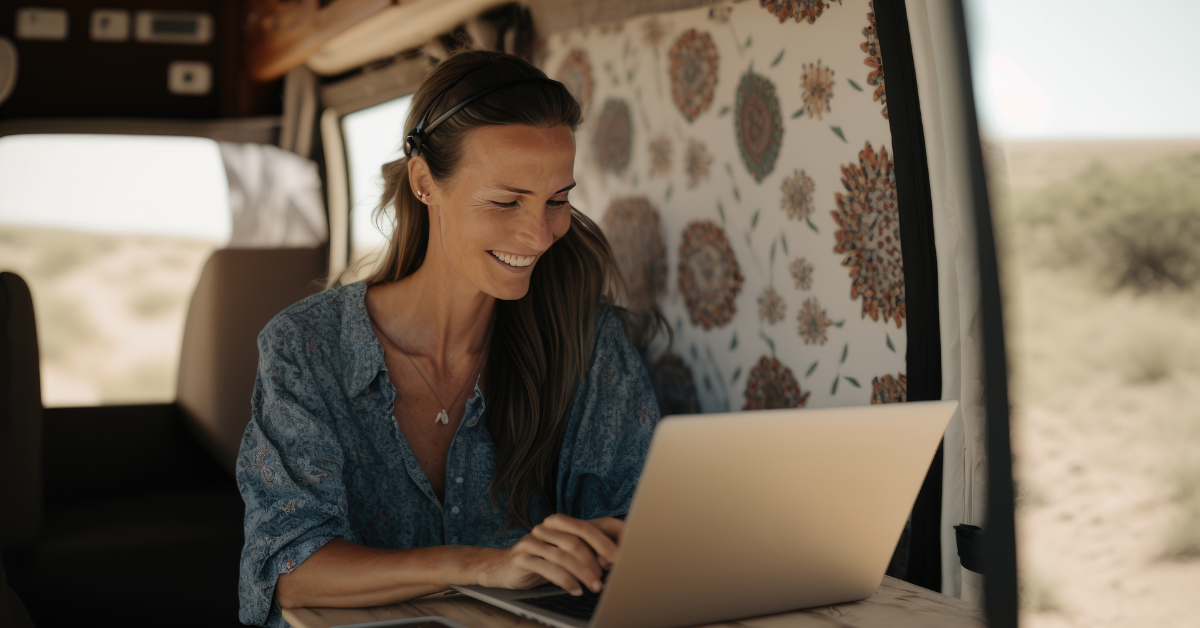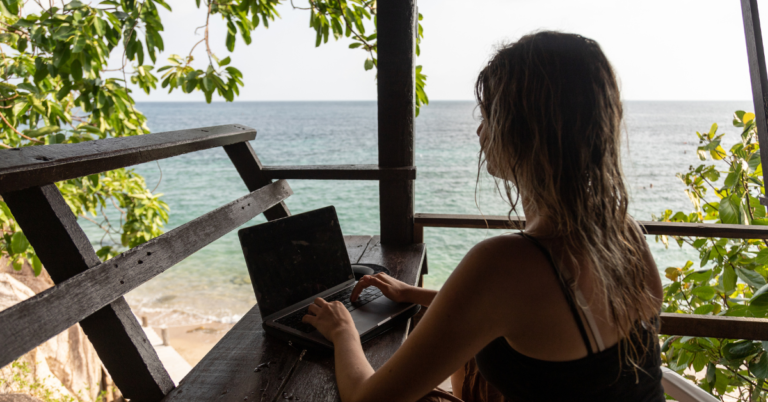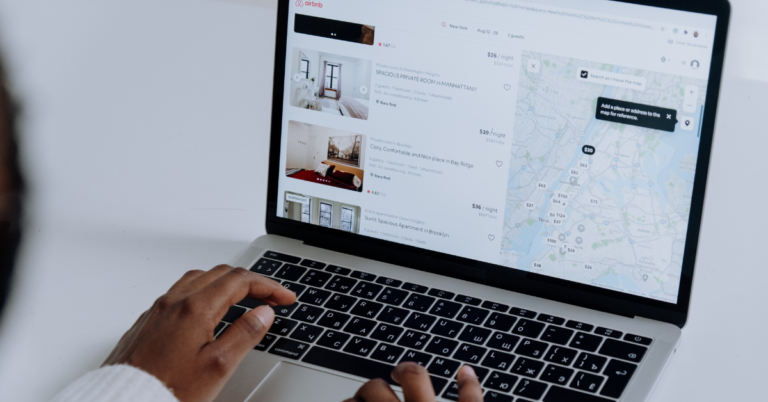What Is A Digital Nomad And How Do You Become One?
Having been a digital nomad for the past 8 years, I can tell you that it offers some amazing freedom.
But it’s not always easy.
From airport lounges to coffee shops and co-working spaces, I’ve worked pretty much everywhere while basing myself in places like Montenegro, Estonia, Spain, Greece and visiting over 40 countries.
Below are my top tips for digital nomads.
What Is A Digital Nomad?
Digital nomads are individuals who leverage technology to work remotely while living a location-independent lifestyle.
With this freedom of movement comes the ability to live and work in any part of the world without being tied down by traditional 9-to-5 job constraints.
This allows us to travel more frequently and explore new cultures while still maintaining career goals and professional growth.
Being a digital nomad is not just about having the freedom to work and travel from any location, it’s also about finding your unique way of life.
Some digital nomads choose to live in hotels, hostels, Airbnbs, sailboats, or RVs while others might prefer living in one place for an extended period of time (aka slowmads).
The beauty of being a digital nomad is that you can tailor your lifestyle to fit your preferences and needs.
Is Being A Digital Nomad The Same As Being Location Independent?
Being a digital nomad and being location independent are terms that are often used interchangeably, but some people believe that there is a distinct difference between the two.
Being a digital nomad does not necessarily mean being location-independent.
Not all digital nomads can afford to be truly location independent due to the high cost of living in some destinations.
And the word “nomad” itself means that you don’t have a home base to return to.
Pros & Cons Of Location Independence
Pros
- The freedom to work and travel
- Potential savings on living costs by avoiding high rent in major cities
- Flexible lifestyle tailored to personal preferences and needs
- Opportunity to learn new skills and languages
- No more toxic office environment
Cons
- Increased risk for loneliness and isolation due to constant travel
- Difficult to maintain relationships with friends and family
- Potential security concerns when traveling to unfamiliar destinations
- Difficulty finding reliable internet connection in some locations
- Difficult to maintain work-life balance when constantly on the go
How Digital Nomads Make Money
Job Examples
- Blogging
- Freelance Writing
- Language Teaching
- Customer Service
- Marketing
- SEO
- Virtual Assistants
- Consulting
- Bookkeeping
How To Find a Remote Job
Identify your skills
Here are some questions that may help you get started:
- What is your current job?
- Do you enjoy it enough to keep doing similar work?
- Could you find a way to make money from one of your hobbies or interests?
Take some time to reflect and make a list of the skills and experiences you have that could be monetized.
I understand that people reading this post are in different positions. Some of you already have the skills, some of you are just starting out and need to learn new skills. And that’s ok too.
You may think that you have no skills to work online, but you’re likely wrong, even knowing how to type and use a computer could be enough to get you started and land a simple remote job.
In this step, take the time to consider what is possible. Don’t be afraid to make a mistake – you can always adjust your path if something doesn’t work out.
Brainstorm job possibilities
Let’s look for ways to turn your skills into digital nomad friendly jobs.
Think outside the box:
- Can you freelance in your industry?
- Are there any remote job opportunities?
- Is it possible to teach online classes or offer consulting services?
Freelancing vs Remote Work
Freelancing is a great option if you have specific skills or services to offer (such as design, programming, writing, etc).
You’ll be able to choose your own hours and projects, but it does require more hustle than a traditional job. At least in the very beginning when you need to find clients, build a portfolio and refine your services.
Alternatively, you may be able to find a remote job that pays a regular salary, but you’ll be tied to fixed work hours.
Start by researching potential employers and jobs on job boards.
Websites For Remote Jobs:
- Flexjobs
- Remote.co
- WeWorkRemotely
Where To Go – Digital Nomad Destinations
- Barcelona
- Mallorca
- Lisbon
How To Become A Digital Nomad
There’s no one-size-fits-all answer, but there are steps you can take to get yourself set up for a successful nomadic lifestyle.
Step 1: Ask yourself why you want to become a digital nomad
Before embarking on your journey, it’s important to know why you want to become a digital nomad in the first place. Is it the promise of location independence? Are you fed up with the daily office routine? Do you seek financial freedom and more travel opportunities?
We’ve all seen that images with hastags #officeoftheday, but it’s not all beaches, sunsets and cocktails – being a digital nomad takes hard work.
Find out what your true motivations are and use that knowledge to make decisions throughout your journey.
My answer is freedom. I wanted to work on my own terms and be location independent. It’s that simple for me. And every decision I make aligns with that goal.
Once you know why you want to become a digital nomad, it’s time to choose the right path for you.
Step 2: Save money
Now it’s time to put your skills and desires into action by creating a plan. The first step is to evaluate your current finances and lifestyle. How much money do you need per month to maintain your current way of life?
Multiply that number by 6 and you have the minimum amout of savings you need before setting off.
Once you know how much money you need, it’s time to reduce your expenses and start saving for your nomadic adventure. Look at how you can reduce costs on things like rent, food and transportation.
Step 3: Choose Your Base & Set Monthly Budget
When looking for a base, it’s always a good idea to ask fellow digital nomads about their monthly budgets in the locations you’re interested in. After all, they’ve been there and done that – they know best!
Ask away in Facebook communities, look at recommendations in expat blogs, and research countries where the cost of living is affordable.
Figure out how you want to live: do you prefer big city life or rural tranquility?
What Not To Do When Becoming A Ditigal Nomad?
- Don’t splurge on expensive technology – sure, it’s nice to have the latest gadgets, but don’t overspend.
- Don’t quit your existing job without any savings – make sure you’ve built up enough of a nest egg before taking the plunge.
- Don’t assume you need to move to Bali or Thailand – you can become a digital nomad anywhere in the world!
- Don’t expect to work less – traveling comes with its own challenges, so don’t assume you’ll have more free time. Especially at the very beginning of your journey.
Traveler’s Block
What Is Travelers Block
When traveling non-stop it felt like I got stuck in a rut about once a month.
I just couldn’t figure things out.
Be it where to go next, for how long, where we will stay, or finding the best route to leave (or a mixture of all of them) we just couldn’t make things work. Over the course of about a week, we would spend all of our time scrambling through Airbnb, Hotels.com, and Skyscanner, trying to put the pieces together. For some reason things just wouldn’t line up and we couldn’t make a final decision. Getting traveler’s block ends up eating a lot of your travel time.
I am not sure why “traveler’s block” happens, but it is much like “writer’s block” in that you just get stuck. We experienced traveler’s block about 5 times in our 6 months of travel. That is a lot considering the stress it puts on us and the amount of time spent trying to figure things out. We wasted whole trips trying to figure out the next step. For example, we were trying to figure out where to go next after Thailand and ended up spending our entire 3 nights/4 days in Krabi looking at flights on Skyscanner.
Now, I love planning trips, but when this planning takes away from the current trip I am in, we have an issue.
There has to be a better way.
How to Overcome It
What I have learned from my experiences of traveler’s block and travel planning is that you can’t change things unless you change your approach. This is the same for most situations where you feel ‘stuck’ or can’t find a solution.
Sometimes the best thing you can do is step back from the problem and re-think your strategy. Doing this really helps your mind clear up and brings on a different perspective. How I apply this to traveler’s block and travel planning is by simply putting a halt on research. It’s easy to get sucked into flight deals on Skyscanner and trying to find the perfect Airbnb. When you go too deep into your research you end up losing sight of what you really want.
The best approach when facing traveler’s block is to stop what you’re doing and really think about what you want. For me, it helps to write down exactly what I am looking for/ hoping to get out of the trip I’m planning.
I also factor in budget, and what makes more sense to visit next from my current location.
The following is the process I am applying to planning trips and that has really helped with traveler’s block.
10 Easy Steps To Plan The Perfect Trip
- Make a list of destinations you are interested in seeing
- Check Skyscanner deals – from your airport of choice to “everywhere”
- See how high the destinations you want to see rank (the higher on the list, the least expensive it is to fly there)
- Narrow down your list to the top 2 destinations on Skyscanner
- Research possible areas to stay in for each destination (check for close proximity to sightseeing, cafes, nightlife, beach, etc.)
- Make a list of things you want for lodging (hotel or airbnb?, full apartment or private room?, has wifi, kitchen, washer/dryer, is modern etc.)
- Search Airbnb or Hotels.com for places that match your desired location and amenities. Do this for both destinations on your list.
- Narrow down your search to the perfect lodging for each destination (can be 2-3 per destination so that they don’t get booked before you book your flight!)
- Figure out which of the possible itineraries for the 2 destinations you like best, and which trip makes more sense for your budget.
- Book your favorite! First book the flight to lock in the dates/price, then book your hotel room/Airbnb apartment. Enjoy your trip!
Following these 10 easy steps has been a game changer for me.
Getting organized and planning in this order helps take the stress away.
It is a much more efficient way of planning a trip and wastes less time than staring blankly at a screen hoping all the pieces will somehow come together.
The Difference Between Vacationing And Long-Term Travel
It’s easy to see traveling as glamorous, going to all these amazing destinations, having life-changing adventures, making new friends…these are all the parts I love most about traveling, yet it’s not all travel is.
It’s rare to hear people talk about the dark side of long-term travel, how exhausting it can be – physically and emotionally. No one talks about how traveling long-term makes you miss out on birthdays, family gatherings, weddings, and anniversaries.
When you go on a vacation you’re typically out of your bubble for a week or two.
You get out of your comfort zone, see new places, make new friends, and perhaps have crazy adventures….and then you fly home and get back to your normal life. You go back to your family and friends. To your job and the house where you feel safe. You go back in your warm bubble with new memories and stories that inspire you to live more.
With long-term travel it becomes your routine. You go through these same experiences, perhaps more intensely as time and fear passes, but you don’t get to go back home to recharge and appreciate what you just experienced. Instead you have intense experiences, form intense connections, see incredible places, and then you leave. Say goodbye to your new friends, and head to the next dreamy place to do it all over again.
Only this time you’re emotionally drained. And with each passing trip you fall further. You don’t get a break to think about everything you just experienced or to recover from the “breakup.” You just told these people your whole life story, shared so much together in such a short time, and now they’re gone!
So for those considering the digital nomad lifestyle, here’s my advice:
Everything in moderation.
It’s an amazing thing getting to see country after country and exploring the world, however, it can also be exhausting! Taking time to just relax and have a lazy day even while traveling is important.
Take your time, listen to your body, heart, and mind, and take time to recharge when needed.





